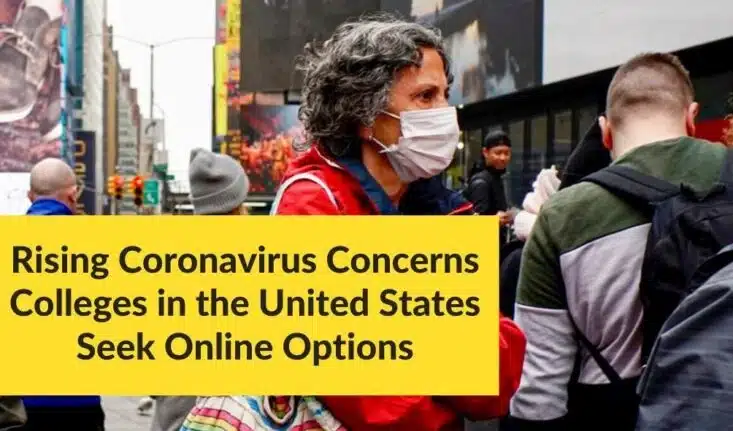Administrations in US colleges are becoming more and more concerned by the day as to how to restrict the impact of coronavirus on studies and seriously considering online options for instructions. After the global outbreak of coronavirus, there is panic among the students as well as faculty members to come to college. In order to lessen the impact of this pandemic overstudies, colleges are pondering over the option of online continuity. Ever since the outbreak of coronavirus in China last year, tens of thousands of people have been reported to have been affected by it. It’s a contagious disease caused by a virus which results in a cold and cough and ensuing fever. Many of the affected people died which raised the alarm and authorities are taking safety measures to isolate the affected people so that this pandemic can be curbed.
Impact Of Coronavirus On The US Colleges:
Due to its contagious nature and a rapidly increasing number of people affected by the coronavirus, many universities in the US have shut down their satellite campuses in infected places. The student exchange program is likely to be affected as well, therefore authorities are seriously brooding over canceling the program for the time being and would ask US entrants to return to the country. Since there are fewer cases of coronavirus found in the US, many colleges believe that they might not get hit by it but are taking precautionary measures. Many colleges suspended classes to clean and disinfect the campus.
Strategies That Can Be Adopted By College Administrations To Save Studies From Interrupting:
Many schools are concerned about the upcoming spring and summer semesters and seeking options to minimize the interruption in studies. Many methods can be considered to impart instructions such as video conferencing, various communication software which is synchronous, and appointing people who can design instructions and aid the faculty to give instructions related to courses online. This way students will not miss on studies and they can avoid the possibility of contracting coronavirus by getting instructions at home and solving their problems through video conferencing.
Challenges of Online Courses:
The biggest challenge faced by the school and college authorities is related to opting for online imparting of instructions. How much the software that will be used can take a load of users and if it becomes necessary to cancel classes on the campus and resort to video conferencing for studies how much it will be effective and how it can benefit thousands of students without delay or interruption. There are chances that software may malfunction due to overload and can further jeopardize the studies. Another real challenge here is to increase and maintain the engagement on the part of students which highly depends upon bringing the class as close as in person. At the same time, instructors with limited knowledge of online instructions can face issues in helping students. It has been seen that students who are already taking online classes are showing a steep curve in engagement. Students who have limited internet access will face difficulties in accessing online material. All these challenges can put the studies in jeopardy and students can end up wasting their two potential semesters.
Possible Solutions to the Aforementioned Challenges:
To avoid disruption of studies, schools and colleges should consider sharing study material with students through other means than online. Students should be encouraged to reach out to faculty members immediately in case they are unable to access course material. Since the coronavirus situation is moving very fast it is important that direct communication should be established between faculty and students. Education techs should be contacted and requested to develop software that can handle the overload. Faulty members should be encouraged to get accustomed to helping the students through online instruction modules. The chances are that for a few weeks, the colleges and schools may have to abandon classes on campus and have to resort to online classes in large numbers in that situation the institutions must prepare in advance and come up with contingency plans that involve moving instructions online with the help of best practices and tech tools by faculty members.



